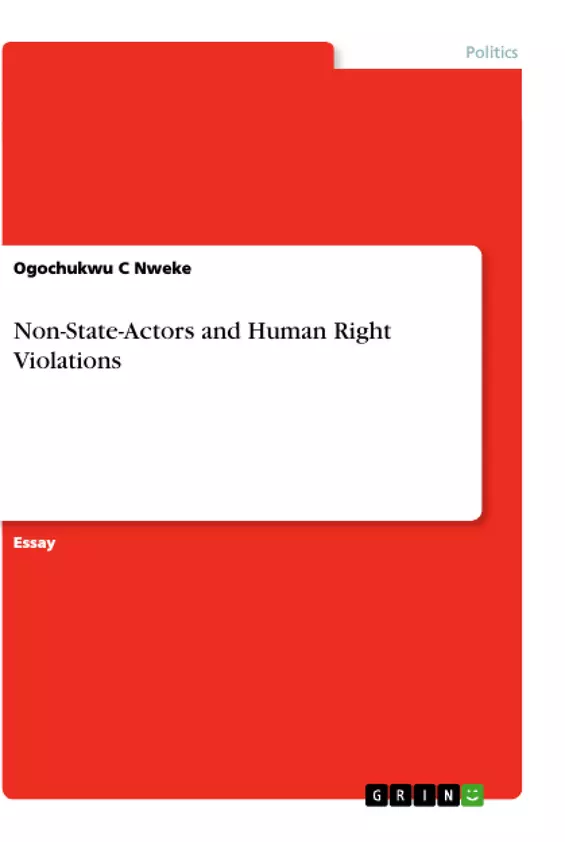The aim of this work is to assess the international, regional and national human rights regimes, to see whether or not non-state actors are bound by the expectations of human rights, why they are not (if they are not) and how they can be taken into account for the human rights violations that their activities cause. In doing this, an assessment of non-state actors, how they are sometimes created by the state and the roles they play in society will be made. Recommendations will be made where necessary on how this important stakeholder, when it comes to international human rights, can be made to be more involved and accountable with regards to issues related to human rights.
The author of this text is not a native English speaker. Please excuse any grammatical errors and other inconsistencies.
Inhaltsverzeichnis (Table of Contents)
- WHO ARE NON-STATE ACTORS
- HORIZONTAL AND VERTICAL APPROACHES
- STATES AND NON-STATE ACTORS
- VIOLENT NON-STATE ACTORS.
- THE WORLD BANK AND INTERNATIONAL MONETORY FUND
- HOW THEN CAN NON-STATE ACTORS BE HELD LIABLE FOR HUMAN RIGHTS VIOLATIONS?..
Zielsetzung und Themenschwerpunkte (Objectives and Key Themes)
This work aims to examine the international, regional, and national human rights regimes to determine if non-state actors are bound by human rights expectations, why they may not be bound, and how they can be held accountable for human rights violations caused by their activities. It assesses the nature of non-state actors, explores their creation by states, and examines their roles in society. The work aims to provide recommendations for increasing the involvement and accountability of non-state actors in human rights issues.
- The legal status of non-state actors within human rights frameworks.
- The accountability of non-state actors for human rights violations.
- The role of states in enforcing human rights against non-state actors.
- The different types of non-state actors and their respective impacts on human rights.
- Strategies for enhancing non-state actor accountability in human rights matters.
Zusammenfassung der Kapitel (Chapter Summaries)
The first chapter introduces the concept of non-state actors (NSA), providing definitions and examples of various types of NSAs, including transnational corporations, civil society groups, international organizations, and violent non-state actors. The chapter explores the legal status of NSAs in international human rights law, highlighting their lack of direct treaty obligations and the challenges in holding them accountable for human rights violations.
Chapter two discusses the horizontal and vertical approaches to enforcing human rights. The vertical approach emphasizes state obligations toward individuals, while the horizontal approach recognizes obligations between individuals, including interactions between individuals and non-state actors. The chapter analyzes the traditional approach to human rights enforcement, which primarily focuses on state obligations, and contrasts it with the African Charter's recognition of individual and non-state actor responsibilities. The chapter also examines the impact of the lack of horizontal effect in human rights law on the enforcement of rights against non-state actors.
Chapter three delves into the relationship between states and non-state actors in the context of human rights. It emphasizes the legal obligations of states as signatories to international human rights treaties and conventions. The chapter outlines the dual responsibility of states to uphold human rights and to prevent violations within their borders. It examines various scenarios where states can be found liable for human rights violations, including direct state actions, complicity, and collaboration with other states.
Schlüsselwörter (Keywords)
The work focuses on non-state actors, human rights, accountability, international law, treaties, conventions, state obligations, horizontal and vertical relationships, civil society, transnational corporations, international organizations, violent non-state actors, and the African Charter.
- Citation du texte
- Ogochukwu C Nweke (Auteur), 2020, Non-State-Actors and Human Right Violations, Munich, GRIN Verlag, https://www.grin.com/document/1167990



